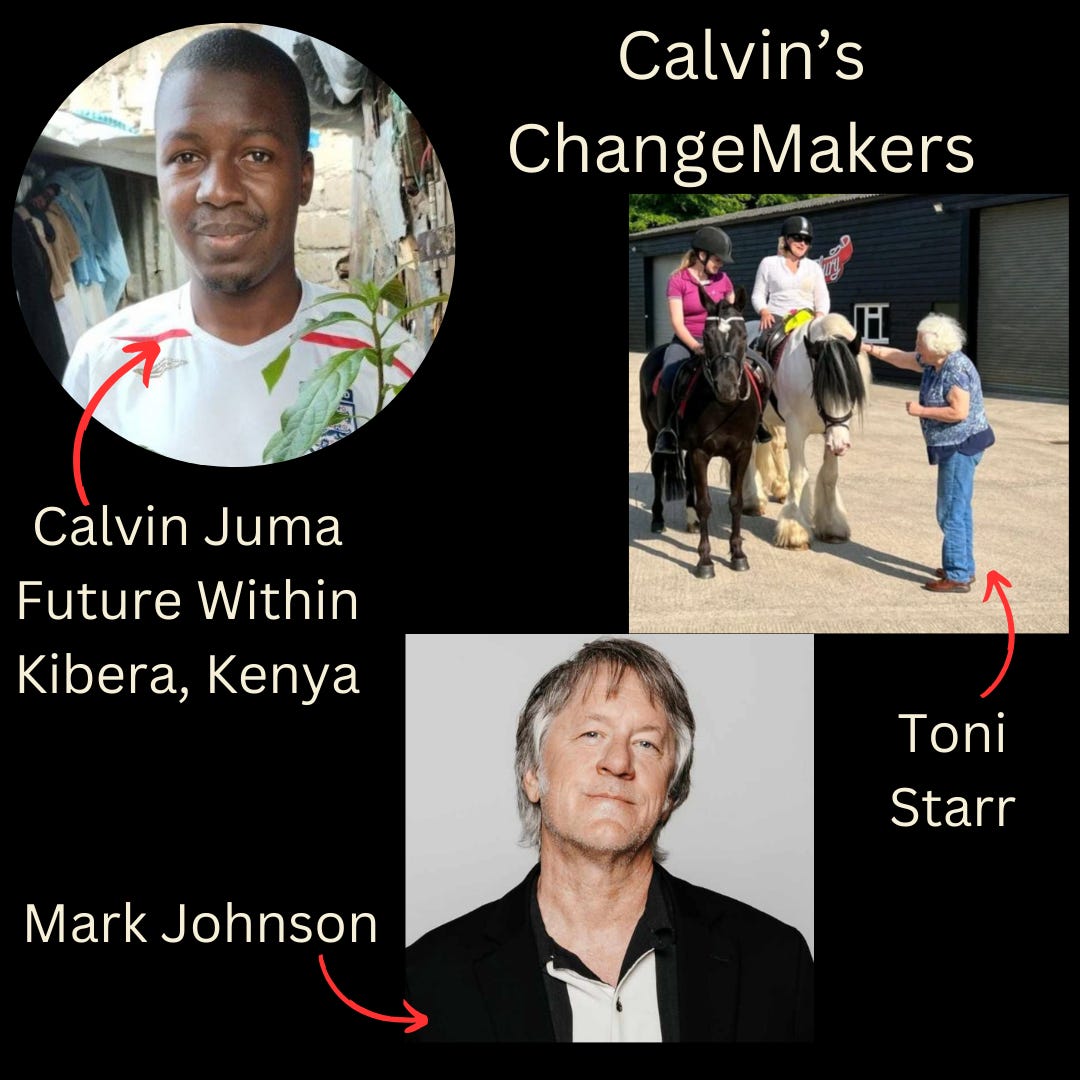Calvin Juma, Future Within CBO
Teaching the Poor and Vulnerable How to Live a Sustainable and Artful Life In Kibera, Kenya, Africa's Largest Urban Slum
Meet Calvin Juma, 26-year old Founder and Director of Future Within, a Community Based Organization located in the Kibera slums on the outskirts of Nairobi, Kenya.
The goal of Future Within is to support and help orphans, the poorest students, and elderly and vulnerable people by providing practical training in soap making, poultry keeping, kitchen gardening and other sustainable practices.
Kibera is Calvin’s home, the place where he was born and raised and continues to live with his wife and young daughter. It is also the largest slum in Nairobi and the largest urban slum of Africa. Slums like Kibera are not only over-crowded, impoverished, unhealthy, and dangerous places to live, they are also vulnerable to the impacts of climate-change related extreme weather events. For instance, people living in Nairobi’s slums experienced devastating destruction, death, and displacement during the May 2024 rains and consequent flooding.

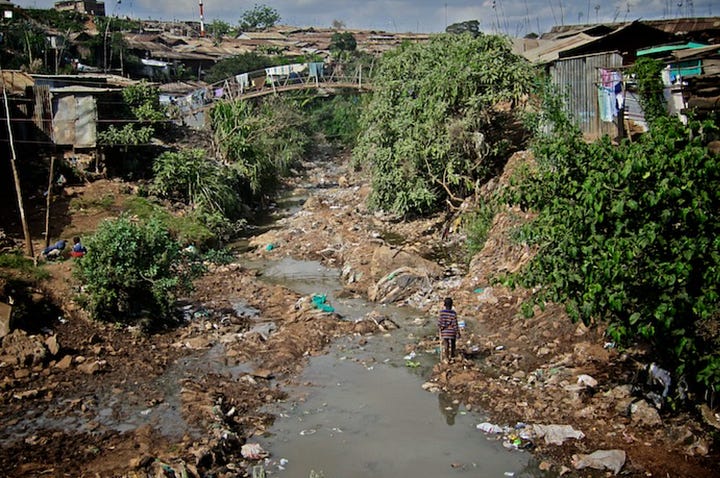
Calvin’s Backstory
Despite the harsh conditions into which he was born, Calvin was able to complete secondary school and even attend and graduate from college with a degree in Hospitality and Hotel Management thanks to the sponsorship of someone he calls “a well wisher.” He always had a knack for cooking and wanted to be a hotel manager. While in school, he maintained a passion for agriculture and farming. “I was doing as much as I could in my free time to grow food,” he says.
In 2020, he was lucky to land a job in a fast food restaurant as a kitchen supervisor. “My hope was that the job would help support my parents and my younger siblings go to school.” By then, his father was working as a carpenter and his mother as a housemaid. He wanted to help them make ends meet.
And then COVID hit. “I lost my job. The business was not able to sustain all of the employees and gradually shut down leaving many unemployed.”
It was then that he decided to turn what had once been a hobby into a full-time effort. He decided to commit his time and energy to farming.
I realized that it was the only thing that could help me and my family to survive the tough COVID-19 time as there was no employment. Our family survived by selling chicken eggs. I started involving myself in other community forums where I could gain soap making skills. I decided to share these skills with others by making liquid soap and distributing it for the community to help in sanitizing and for domestic use.
After gaining more momentum and getting help from other youth within the community, he and ten others formed a community based organization. They started by volunteering and organizing cleanups and waste collection.
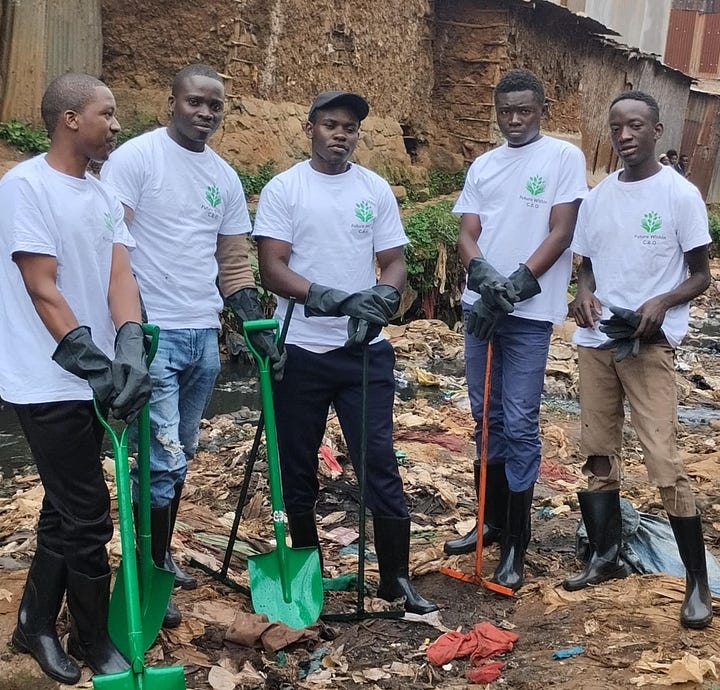
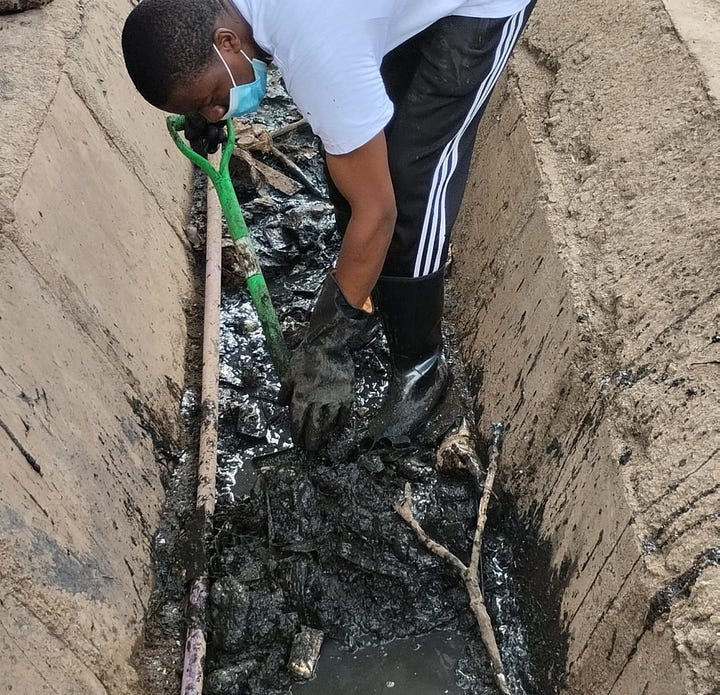
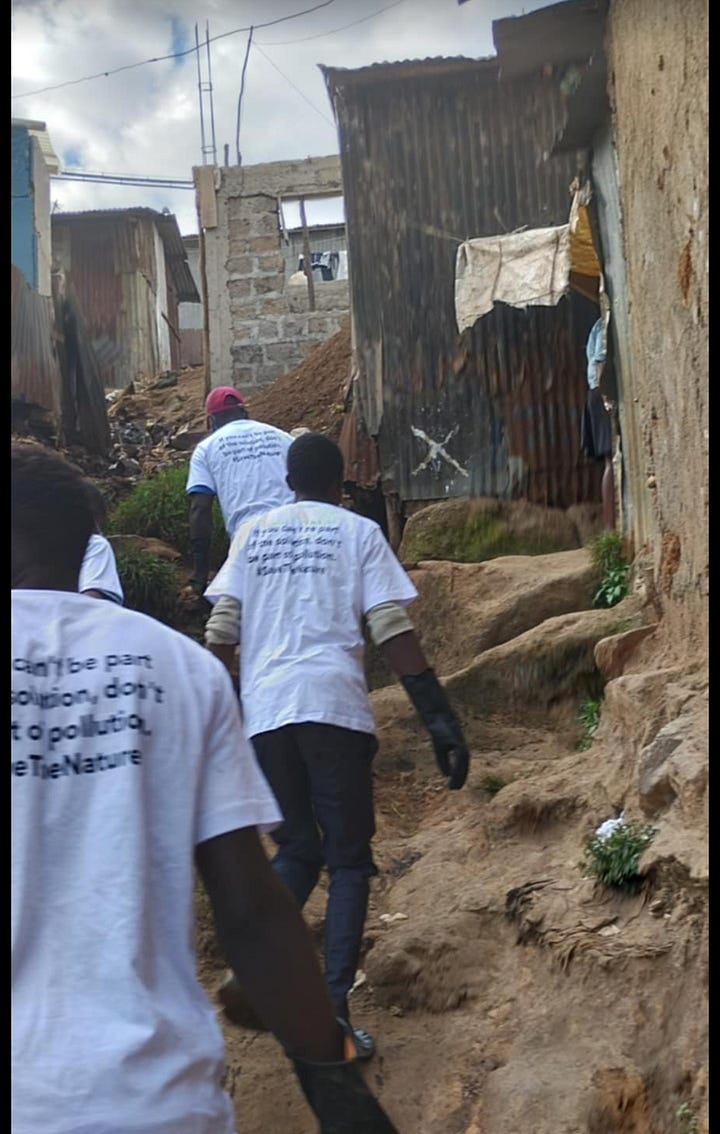
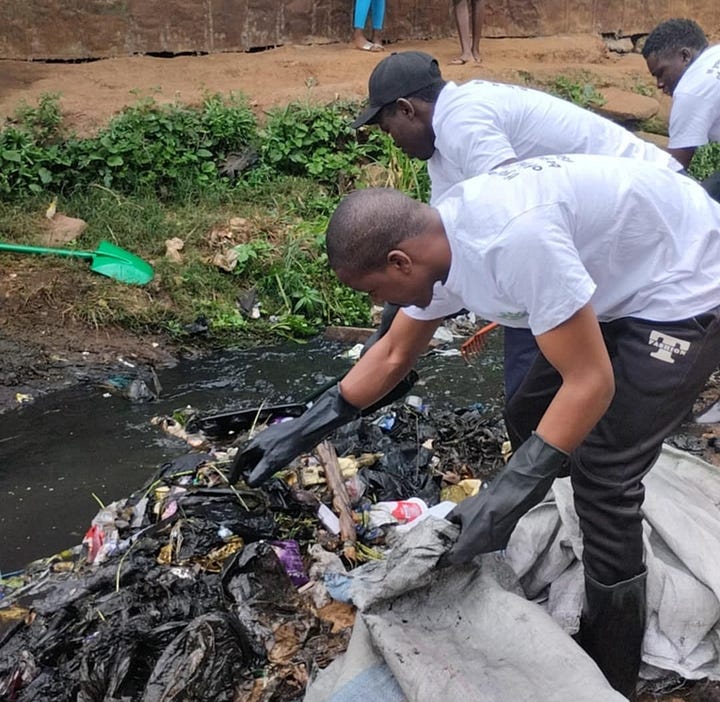
Through my network of friends on social media, a few people on the other side of the world were inclined to help and closely followed our progress. My wife Florence also volunteered by training women on safe menstrual hygiene practices and other educational programs.
The seeds of Future Within had been planted and were starting to grow.
Future Within Builds Skills and Opens Doors for a Better Life for the Most Vulnerable
Calvin and his colleagues have since formalized their organization and expandedprogramming to focus on sustainable growing and living as a way to improve nutrition, health and food security for Kibera families. In addition to providing instruction in container gardening, they also teach soap making and host an art program serving dozens of vulnerable children and youth.
Rooftop Container Gardening
Due to overcrowding and housing density in Kibera, container gardening on rooftops is the most feasible way to grow vegetables and is practiced widely by young people in Kibera. Future Within provides children with hands-on instruction so they can use their skills to grow their own vegetables.
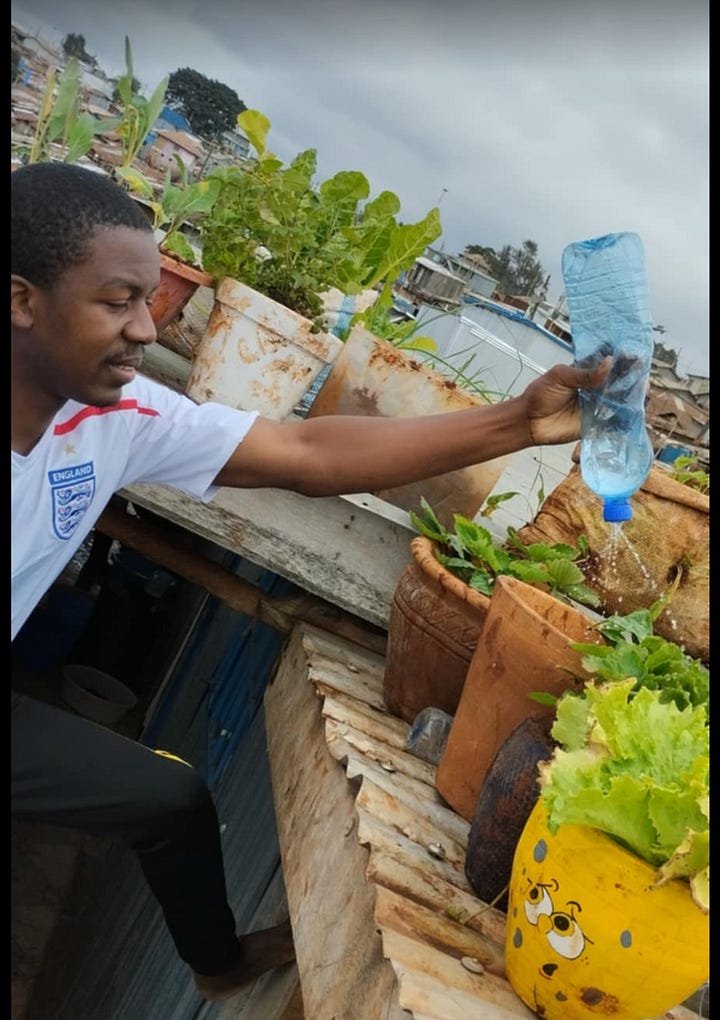
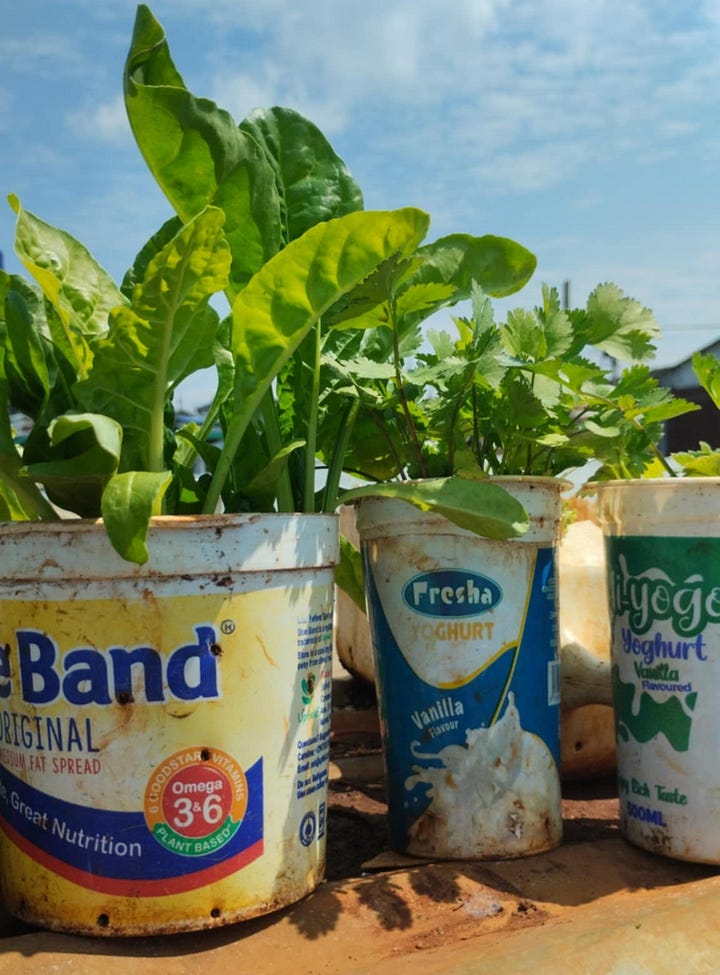


Poultry Program: Ducks, Chickens, Roosters
A source of food and additional income, Calvin and Florence keep a wide variety of egg-producing ducks and chickens and teach the children how to care for the animals.


Soap Making
Calvin shares his soap making skills and knowledge he taught himself during COVID with Future Within children.
Supporting Dreams - An Art & Storytelling Partnership With Luca
Alongside its other programming, Future Within also offers an arts program called Supporting Dreams with a friend in Italy named
. Together, Calvin and Luca introduced the use of computers and created a blog called “Talented Kids Kabera” where children publish stories about their experience with the art project and any other thing they feel like they should share to the world.This project was born with the aim of offering children, and young people in Kibera, an opportunity to draw and improve their artistic skills. Schools in Kenya struggle to provide students with opportunities to study art education and learn to acquire the technical skills to express themselves through art.



We are using art as a tool for social promotion and change. We realized that most kids feel so embarrassed and are shy to express themselves verbally. Art is therefore a better space for them to convey particular messages to the community, about what they feel, without the fear of being judged.
Over the course of our first year of activity we noticed that art had a positive effect on students and it continues to benefit their physical and mental health, helping kids relieve daily stress and gain greater self-esteem and self-confidence.
Serving Many In A Space Made for Few
Just like the Kibera slums, Future Within’s operating space is too small for the number of people served. Their arts education project alone, for instance, serves upwards of 80 children although not at one time due to the space constraints.
One of the biggest challenge we are facing is lack of space and we are renting a very small room for conducting all these activities. At the moment we are still volunteering but we hope the project will be self sustainable.
With the need so large and resources so limited, Calvin is looking for ways to earn money to sustain operations and support material purchases. One way is by renting out the plastic chairs and room they have to other people for functions and ceremonies.
We are still growing and our project runs on small donations from donors. It is easier for the donors to choose where they want to help and in which field of interest they need their help to be used.
Our organization is steadily trying to address and offer solutions on ways we can reduce these challenges. We are committed to ensuring that every child can access education and get the materials they need to thrive in life.
Still, Calvin and the 10-member team of Future Within continue to find ways to bring programming to the children of Kibera.
An Insider’s Perspective: Kibera Slums
Calvin is the first person I’ve met and interviewed who lives in Kibera. Completely unfamiliar with Kibera, I asked Calvin to provide an insider’s perspective on what it is like living there.

He obliged me by providing the following list of Kibera's attributes, the cumulative negative impact of which on human life is staggering:
In Kibera slums people live in relentless and degrading poverty. People live in small, cramped, dark single room huts that mostly consist of mud walls, a corrugated tin roof and a dirt concrete floor. It's actually common for 5 or more family members to live in one hut.
Only 50% of residents are employed. The crime rate is high as are school dropouts and unwanted pregnancies.
Work tends to be cheap unskilled labour such as clothes washing and manual labour which many young school going kids would find themselves doing in order to pay school fees.
As a result of high unemployment, many young men are sitting, doing nothing, and therefore start using drugs which often leads to criminal activities.
Our women face gender inequality. Cases of rape and assault are common. Teenage pregnancy is high. Additional health risks include a high death rate in child birth and extreme gender discrimination creates a strong barrier for women accessing health facilities.
Most sewage runs downhill in open ditches, resulting in stagnation, breeding insects and environmental pollution. The unsanitary condition becomes a breeding ground for water and airborne diseases such as typhoid and cholera.
Children bear the brunt of the conditions of poverty, explained Calvin. “As the most vulnerable, thousands of children live through no fault of their own in extreme poverty without access to sanitation, electricity, medication, clean water, electricity and adequate education… which are the basic rights of any child.”
Another Seed Planted
Calvin’s parents own and live on a small piece of land in a rural area of Kenya called Bondo. Calvin visits nearly ever month, teaching community members from there the importance of tree planting. In the past few months, he was able to establish a greenhouse in Bondo and hopes to transport the produce he grows there back to Kibera to improve food security and nutrition. Due to space limitations in Kibera, he couldn’t set up a greenhouse there, so he installed it in Bondo to benefit both those in Kibera and the rural community.
Perhaps this is an opportunity for income generation? A way to expand his programming? A way to bring more healthy options to children? Based on Calvin’s achievements so far, the trend seems to suggest he will find a way.
Who are Calvin’s ChangeMakers
Calvin identifed Mark Johnson (United States) and Toni Starr (United Kingdom) as his ChangeMakers. “Mark was the first person that came into my life and supported by dreams,” Calvin says.
Calvin’s parents had lived in Kibera for many years and wanted to move out to a rural area but did not own any land. In 2022, his uncle gifted his father a little land to build their house in Bondo, near Lake Victoria, a 9-hour drive from Kibera.
Toni Starr and Mark Johnson supported us and my parents to build a house there and move out of Kibera after hopelessly staying in the slums for many years. Toni and Mark also helped us acquire basic things that are required to live in a rural area such as rainwater tanks, solar panels for light, constructing a pit latrine and much more.
Mark and Toni have done so much for my family and the community. They have walked with me through thick and thin, offering not only financial support but also moral support. Through them, I have achieved so much and I feel like I have them as family.
Mark and Toni also helped Calvin acquire an egg incubator machine to increase his flock in his little Kibera-based farm. They also helped him build poultry houses in both Bondo and Kibera as well as acquire a greenhouse to increase food security for his family and community.
They were the first supporters to come into my life and I have known them for three years now. We are still walking together in the path of life. I feel so blessed to know them and they inspire me to forward the kindess to others.
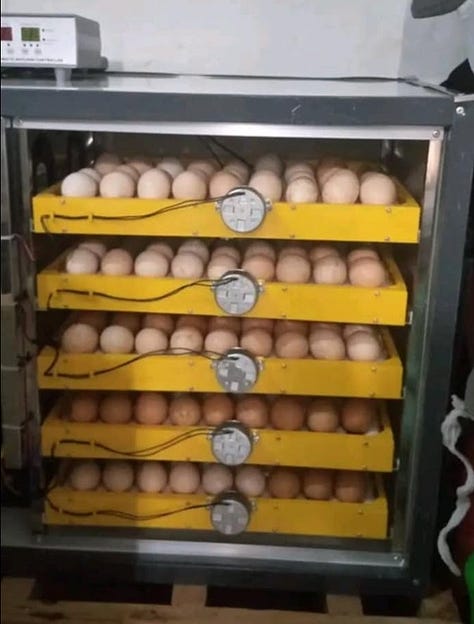


This support has helped Calvin, his wife Florence, and their young daughter Larissa Debra make a living in Kibera.
I raise ornamental birds apart from chickens. I sell both the birds and the eggs to earn a little income. I have a little incubator where I place chicken eggs and once they hatch I sell the chicks at affordable prices to the community.










